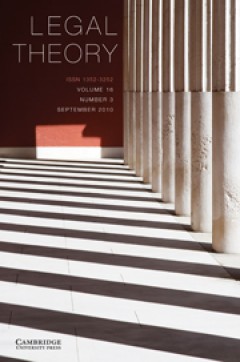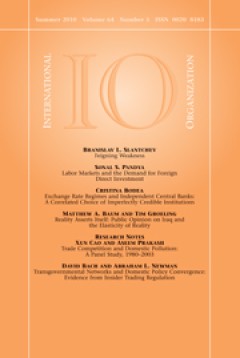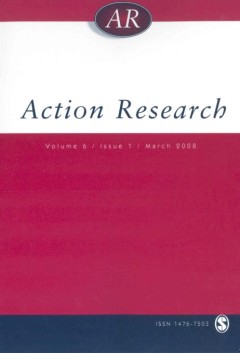Filter by

THE GETTIER PROBLEM AND LEGAL PROOF
This article explores the relationships between legal proof and fundamental epistemic concepts such as knowledge and justification. A survey of the legal literature reveals a confusing array of seemingly inconsistent proposals and presuppositions regarding these relationships. This article makes two contributions. First, it reconciles a number of apparent inconsistencies and tensions in account…
- Edition
- Vol. 16, No. 1, March 2010.pp. 37-57
- ISBN/ISSN
- 13523252
- Collation
- -
- Series Title
- Legal Theory
- Call Number
- -

Goliath's Curse: Coercive Threats and Asymmetric Power
States typically issue compellent threats against considerably weaker adversaries, yet their threats often fail. Why? Expanding on a standard model of international crisis bargaining, I argue that a theory of reputation-building can help shed light on this puzzle. The model casts reputation as a strategic problem, showing that challengers issuing compellent threats have incentives to anticipate…
- Edition
- Vol. 64, No. 4, Fall 2010.pp. 627-660
- ISBN/ISSN
- 00208183
- Collation
- -
- Series Title
- International Organization
- Call Number
- -

Final reflections, unanswered questions
The interest in theory is greater than we anticipated. However, in looking at the role of theory in action research, there are more questions than answers. With few exceptions, the way in which theory is built from experience remains elusive. How is it done? It seems that frameworks are useful in making sense of the world. But which frameworks? What do they leave out? How accessible are they to…
- Edition
- Volume 7, Issue 1. March 2009. pp. 117-120
- ISBN/ISSN
- 14767503
- Collation
- -
- Series Title
- Action Research
- Call Number
- -

Building emergent situated knowledges in participatory action research
Participatory action research (PAR) draws theoretically on the concepts of symbolic interactionism, particularly with regard to the collaborative construction and production of meanings. This article describes how action research builds meaningful theory at the local level thereby enabling researchers, researcher-participants and their local partners to foreground shared local understandings to…
- Edition
- Volume 7, Issue 1, March 2009. pp. 101-115
- ISBN/ISSN
- 14767503
- Collation
- -
- Series Title
- Action Research
- Call Number
- -
Theory in action research
In this prologue to the special issue on theory in action research we provide a context and an introduction for the articles that follow. We begin by sketching in some of our shared ideas on theory in action research and some of the differences between our own approaches. Then, after briefly describing the process of preparing this issue, we provide a succinct pointer to each article in the issue.
- Edition
- Volume 7, Issue 1, March 2009. pp. 5-12
- ISBN/ISSN
- 14767503
- Collation
- -
- Series Title
- Action Research
- Call Number
- -
The `f' word has everything to do with it, How feminist theories inform actio…
This article considers how feminist theories have and can contribute to action research, while acknowledging some of the tensions that arise when applying and building feminist theories. While feminist theorizing undoubtedly occurs in some action research, whether it is named or not, the gap appears to be in linking local knowledge to existing theoretical frameworks. Feminist theories, even tho…
- Edition
- Volume 7, Issue 1, March 2009. pp. 13-29
- ISBN/ISSN
- 1476-7503
- Collation
- -
- Series Title
- Action Research
- Call Number
- -
There is nothing so theoretical as good action research
The goal of this article is try to retrieve the idea of `good theory' that provides accessible and useful tools for practitioners, academics, and other participants in action research. In doing so, we advocate the importance of explicit theory building and testing as an integral part of action research practice. The association of theory with positivist research methodologies has resulted in th…
- Edition
- Volume 7, Issue 1, March 2009 pp. 31-47
- ISBN/ISSN
- 1476-7503
- Collation
- -
- Series Title
- Action Research
- Call Number
- -
Big returns for a little more investment, Mapping theory in emergent research
Action researchers can effectively uncover the theory embedded within inquiries by using a combination of analysis approaches and heuristic models already widely known. Presented here is one approach for mapping theory to capture elements of both program theory and theory of practice. Using a case of a Participatory Evaluative Action Research (PEAR), the article demonstrates how data collected …
- Edition
- Volume 7, Issue 1, March 2009. pp. 49-68
- ISBN/ISSN
- 1476-7503
- Collation
- -
- Series Title
- Action Research
- Call Number
- -

Building grounded theory in action research through the interplay of subjecti…
In this article, I contribute to the discourse on building theory within the context of action research. Specifically, drawing on advaita (non-dualism) philosophy from Hinduism, I describe a holistic framework which views life as holistic, that is, comprising both subjective and objective views of reality and thus promoting interplay between ontological subjectivity and epistemological objectiv…
- Edition
- Volume 7, Issue 1, March 2009. pp. 69-83
- ISBN/ISSN
- 1476-7503
- Collation
- -
- Series Title
- Action Research
- Call Number
- -

Generating living theory and understanding in action research studies
The paper explains how individuals can generate their living theories from action research as explanations for their educational influences in learning. The epistemological significance of these explanations is explored in terms of the energy and values that are expressed in explanatory principles of learning in enquiries of the kind, `How do I improve what I am doing?'. Limitations in the expr…
- Edition
- Volume 7, Issue 1, March 2009 pp. 85-99
- ISBN/ISSN
- 14767503
- Collation
- -
- Series Title
- Action Research
- Call Number
- -

Leveraging acculturation through action research: A case study of refugee and…
The demographic changes in contemporary American society portend serious consequences with far-reaching implications for the future development of the country. One of the more serious challenges is in the influx of refugees and new immigrants many of whom are not acculturating as easily as in the past. Unfortunately, the use of conventional research methods in studying acculturation has not yie…
- Edition
- Vol. 7, No. 2, June 2009. pp. 127-142
- ISBN/ISSN
- 1476-7503
- Collation
- -
- Series Title
- Action Research
- Call Number
- -

Participative research in a remote Australian Aboriginal setting
This article describes the research process used to develop and evaluate an Internet-based resource aimed at improving access by health professionals to Australian Aboriginal cultural knowledge specific to pregnancy and childbirth. As a result of the research, women's stories from Maningrida were recorded and presented on the `Birthing Business in the Bush Website' which provided a platform for…
- Edition
- Vol. 7, No. 2, June 2009. pp. 143-163
- ISBN/ISSN
- 1476-7503
- Collation
- -
- Series Title
- Action Research
- Call Number
- -

Reflecting on community/academic `collaboration': The challenge of `doing' fe…
This article articulates many of the issues that feminist participatory action researchers confront in attempts to conduct collaborative research with community organizations and the state (see Brydon-Miller, McGuire, & McIntyre, 2004; Gatenby & Humphries, 2000; Reid, Tom, & Frisby, 2006; Sullivan, Bhuyan, Senturia, Shiu-Thornton, & Ciske, 2005). As recent PhD sociologists, the authors were hir…
- Edition
- Vol. 7, No. 2, June 2009. pp. 165-184
- ISBN/ISSN
- 1476-7503
- Collation
- -
- Series Title
- Action Research
- Call Number
- -

Discovering what the people knew: The 1979 Appalachian Land Ownership Study
The Appalachian Land Ownership Study is recognized as a pioneering effort in the interdisciplinary field of participatory action research. This article analyzes this community-based study of land ownership and taxation in Appalachia to determine what lessons it offers a new generation of action researchers. It demonstrates both the practical difficulties in community-based research as well as t…
- Edition
- Vol. 7, No. 2, June 2009. pp. 185-205
- ISBN/ISSN
- 1476-7503
- Collation
- -
- Series Title
- Action Research
- Call Number
- -

Dilemmas of trustworthiness in preservice teacher action research
Can preservice teachers carry out trustworthy action research? We have found that action research can be a powerful experience for preservice teachers. Yet preservice teacher action research projects involve complexities unique to a preservice teacher's position as `guest', `student', `teacher', and `researcher'. In this article, we suggest criteria for trustworthy preservice teacher action res…
- Edition
- Vol. 7, No. 2, June 2009. pp. 207-226
- ISBN/ISSN
- 1476-7503
- Collation
- -
- Series Title
- Action Research
- Call Number
- -

Dissemination in action research
Lewin proposed three goals for action research: to advance knowledge; to improve a concrete situation; and to improve behavioral science methodology. The three objectives cannot be met by a single mode of dissemination. Innovative dissemination strategies will be necessary. Action researchers should publish substantive articles in technical journals to reach colleagues; applied articles in peri…
- Edition
- Vol. 7, No. 2, June 2009. pp. 227-236
- ISBN/ISSN
- 1476-7503
- Collation
- -
- Series Title
- Action Research
- Call Number
- -

Initiating action research: Challenges and paradoxes of opening communicative…
The success or failure of an action research venture often depends on what happens at the beginning of the inquiry process: in the way access is established, and on how participants and co-researchers are engaged early on. �Opening communicative space� is important because, however we base our theory and practice of action research, the first steps are fateful. We draw on Habermas�s theorizing …
- Edition
- Vol. 7, No. 3, September 2009.pp. 243-262
- ISBN/ISSN
- 1476-7503
- Collation
- -
- Series Title
- Action Research
- Call Number
- -

The paradox of participation in action research
Although participation is widely discussed in the action research literature, relatively few studies deal with building the participative relationship itself. This article attempts to fill that gap through a �first-person action research� involving a relationship between Jewish researchers and a Palestinian Arab non-governmental organization in Israel that failed to live up to our espoused valu…
- Edition
- Vol. 7, No. 3, September 2009.pp. 263-290
- ISBN/ISSN
- 1476-7503
- Collation
- -
- Series Title
- Action Research
- Call Number
- -

Only to connect: Systems psychodynamics and communicative space
This article provides an example of the contribution a systems psychodynamic approach can make to action research. Drawing from a case study of a complex inter-organizational project, the authors argue that the concept of �communicative requires consideration of affectivity, and the holding of an emotional space for people to connect symbiotically with each The case material illustrates how sys…
- Edition
- Vol. 7, No. 3, September 2009.pp. 291-312
- ISBN/ISSN
- 1476-7503
- Collation
- -
- Series Title
- Action Research
- Call Number
- -
Local communities empowered to plan?: Applying PAR to establish democratic co…
This article presents the second cycle of an ongoing participatory action research (PAR) project that aimed at facilitating bottom-up, sustainability planning and development in one of the most socio-economically disadvantageous micro-regions of Hungary. The process at the very beginning started as conventional qualitative research, and gradually emerged to a PAR process as deeper relationships…
- Edition
- Vol. 7, No. 3, September 2009.pp. 313-334
- ISBN/ISSN
- 1476-7503
- Collation
- -
- Series Title
- Action Research
- Call Number
- -
 Computer Science, Information & General Works
Computer Science, Information & General Works  Philosophy & Psychology
Philosophy & Psychology  Religion
Religion  Social Sciences
Social Sciences  Language
Language  Pure Science
Pure Science  Applied Sciences
Applied Sciences  Art & Recreation
Art & Recreation  Literature
Literature  History & Geography
History & Geography